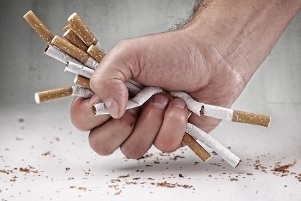The stories that smoking cessation does not go unnoticed are absolutely true. There are many reasons for this. This, of course, is the well-known physical and mental dependence and the ability of nicotine to actively participate in the metabolic processes of the human body. Let's try to understand in detail what happens when you quit smoking, but you just do not need to think that the goal is to scare smokers who, after reading, will be afraid to quit smoking. All the benefits of quitting cigarettes will certainly be listed. Everything will be aimed only at making tobacco lovers at least think about giving up smoking?

Consequences of quitting smoking
It is indeed known that stopping nicotine intake in the body leads to a temporary metabolic disorder, which in humans is often accompanied by a feeling of hunger. Naturally, its hardening leads to the appearance of excess body weight.
It has long been known that smoking cessation can lead to withdrawal. This is because nicotine has a mild narcotic effect and, like any drug, is addictive and withdrawal leads to withdrawal, which is expressed as follows:
- nervousness and irritability;
- nasal congestion and runny nose;
- increased sweating;
- nausea;
- headache.
Of course, these are just common symptoms. Their presence may be related, for example, to a disease, and the fact that this happened when a person quits smoking is simply evidence of a strong tobacco dependence in the patient.
Nicotine is a type of doping for the body, if you quit smoking, it can have consequences in the form of weakening of the immune system, which is associated with temporary depression of the nervous system due to lack of nicotine stimulation.
After a while (on average two to three weeks) after quitting smoking, a dry (sometimes painful), quite frequent cough appears. What happens to your lungs when you quit smoking? The lack of regular intake of nicotine and tar with cigarette smoke leads to the fact that the lungs begin to gradually clear of them, and this leads to the appearance of such a cough.
This is extremely rare, but there is still the development of stomatitis. This usually happens for the first time after a person quits smoking. It manifests itself in the form of ulcers on the oral mucosa.
Mental changes after quitting occur in almost 100% of cases. What happens when you quit smoking, with our psyche? There are many things here:
- The decrease in communication with smoking friends may be accompanied by a feeling of abandonment (regular visits to the smoking room with them are held by discussing many different issues, without which one begins to feel lonely); x / li>
- Changing familiar, regular rituals (such as after a meal, a cup of coffee, or a glass of beer) causes discomfort;
- any stressful situation begins to draw energy and determination much faster than when a person is addicted to cigarettes, tobacco somehow helps to calm the nerves faster;
- in the process of withdrawal from nicotine it becomes more difficult to concentrate;
- Decreased self-esteem is the most common consequence of quitting smoking, which is actually a human delusion, because only the lack of cigarettes causes panic, non-smokers do not have such feelings.
This is not a complete list of what happens to a person when he quits smoking. Most of these effects develop when the supply of nicotine to the body suddenly stops. In this regard, many ask the question, is not it harmful to abruptly quit smoking? All this can persuade the smoker to give up cigarettes. It would be wrong not to talk about the other side of the coin, after which it will be possible to think about whether to quit smoking.
Pros of quitting smoking
The goal is not to convince anyone of something, it's just a call to consider giving up cigarettes.
The biggest advantages of giving up are:
- cessation of exposure to tobacco toxins;
- no cigarette costs;
- ending the harmful effects of cigarette smoke on your loved ones;
- improve the functioning of taste buds, the ability to enjoy the full range of flavors of your favorite dishes;
- freedom from addiction, termination of the nicotine connection;
- improving the condition of the skin, slowing down its aging
- add free time that can be used productively;
- improved sense of smell, the ability to smell more subtly;
- the ability to fully, most importantly, more effectively engage in sports;
- improve memory.
Some of these positive aspects of quitting nicotine may seem small, but it will certainly help to at least consider whether to quit smoking altogether. And this is already the choice of the right path. There will always be better things in getting rid of a bad habit, because it gives health and freedom. These are perhaps the two most valuable things in human life. And you should not be afraid of what happens when you stop smoking. One is fully capable of coping with all this and most of the psychological consequences of quitting smoking are simply invented by the person himself.























